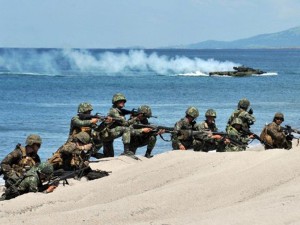
US and Philippine Marines simulate an amphibious landing as part of RP-US Amphibious Landing Exercise on a beach in San Antonio, Zambales on October 23, 2011. AFP
WASHINGTON—The United States is forging ahead with plans to expand its military power in Asia, with the Philippines and other allies welcoming troops and the Pentagon devoting funds to design cutting-edge weapons.
Despite pressure to curb spending, President Barack Obama has made clear that he will put a top priority on maintaining the US military’s dominant role in East Asia at a time when China is rapidly building its own armed forces.
After two days of talks, senior officials from the United States and the Philippines pledged Friday to enhance security cooperation. The former US colony is locked in increasingly acrimonious disputes with Beijing in the West Philippine Sea (South China Sea).
In Manila, Foreign Secretary Albert del Rosario said the Philippines was looking to doing more joint exercises with the United States as well as having a greater number of US troops rotate through the Southeast Asian country.
The offer comes two months after Obama, on a visit to Australia, announced that the United States would post up to 2,500 Marines in the northern city of Darwin by 2016-17.
The United States also plans to forward-deploy littoral combat ships in Singapore, a longtime US partner with a strategic position.
Such moves are in line with the strategy of US military planners, who want forces to be more agile and closer to potential trouble zones without the costs — both financial and political — of permanent bases.
Admiral Robert Willard, the chief of the US Pacific Command, said that the United States was not looking for more bases in the region beyond those for the more than 85,000 troops in Japan and South Korea.
“There is no desire nor view right now that the US is seeking basing options anywhere in the Asia-Pacific theater,” he told a news conference in Washington.
“Initiatives such as Australia offered or such as Singapore offered to allow us to rotate forces from locations that are closer and more adjacent to Southeast Asia afford Pacific Command the opportunity to more conveniently have its presence there and felt,” he said.
Pentagon spokesman Captain John Kirby said: “We’re going to rebalance our focus more to the Asia-Pacific, which is going to require a much more robust partnering program than we’ve had in the past with many nations in that region.”
The Pentagon, under pressure to cut spending, unveiled a plan Thursday that would take some 100,000 troops off active duty, although the total would remain above the level before the Afghanistan and Iraq wars.
The plan — which will likely be the subject of intense debate on Capitol Hill — would withdraw two brigades from Europe and slow down or retire cargo jets, cruisers and the latest Ohio nuclear submarine.
But the proposal funds research on a number of projects considered key to any potential conflict with China, including a next-generation super-stealth bomber that could penetrate deep past enemy defenses.
The Pentagon also wants to fund upgrades to air and ship radar systems and to design the fast-attacking Virginia-class submarine to be able to fire more cruise missiles.
China’s territorial disputes with countries including Japan, the Philippines and Vietnam have grown rockier in recent years, with the Asian neighbors accusing Beijing of aggressive behavior.
China has insisted that its growth is natural and that it does not pose a threat to any other nation. Beijing has repeatedly warned the United States to be careful and not aggravate conflicts.
US officials are careful in public not to describe China as a threat. They argue that Washington’s hefty defense investment in post-World War II Asia has benefited China by allowing it to concentrate on domestic growth instead of external threats.
“The interest by Pacific Command and the interest from the United States is that this be a secure and stable and prosperous region of the world,” Willard said.
While the focus on Asia enjoys broad support in Washington, some liberal members of Obama’s Democratic Party have called for greater cuts by the Pentagon.
Four House Democrats — Barney Frank, Rush Holt, Barbara Lee and Lynn Woolsey — saw no need to expand to Australia and called for savings by closing the unpopular Futenma base in Okinawa that has long plagued ties with Japan.
“It is time to bring our defense spending in line with the actual threats we face, and invest the savings in nation-building at home,” they wrote in a letter to Obama.

